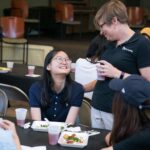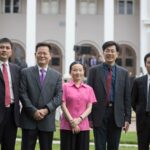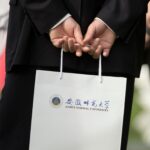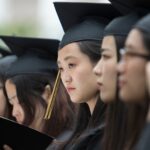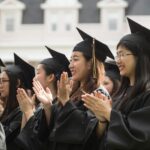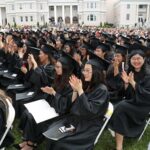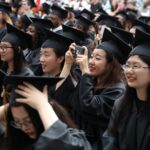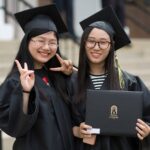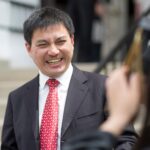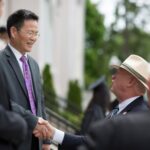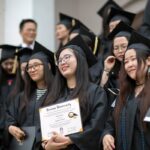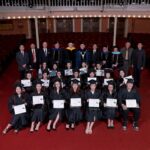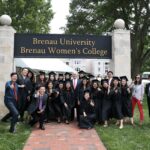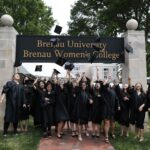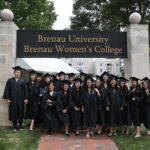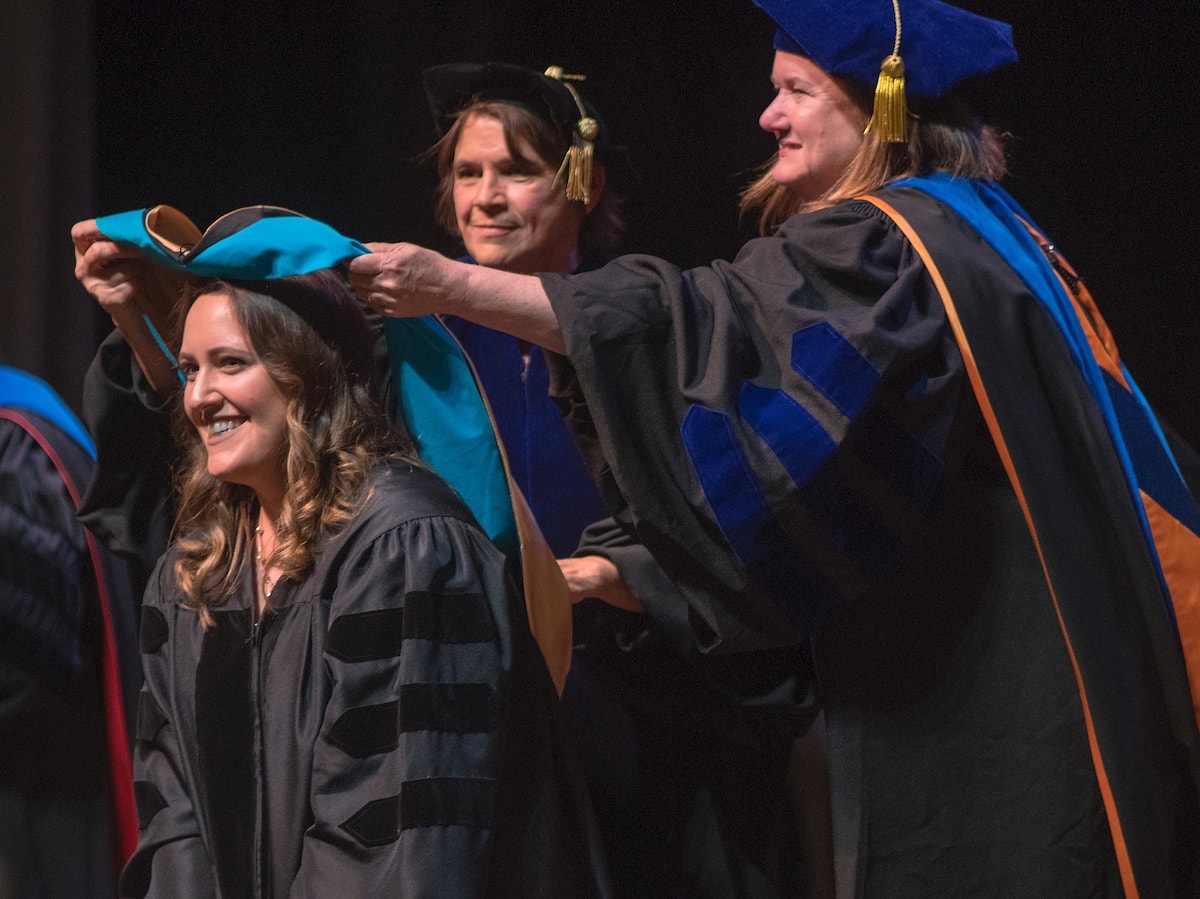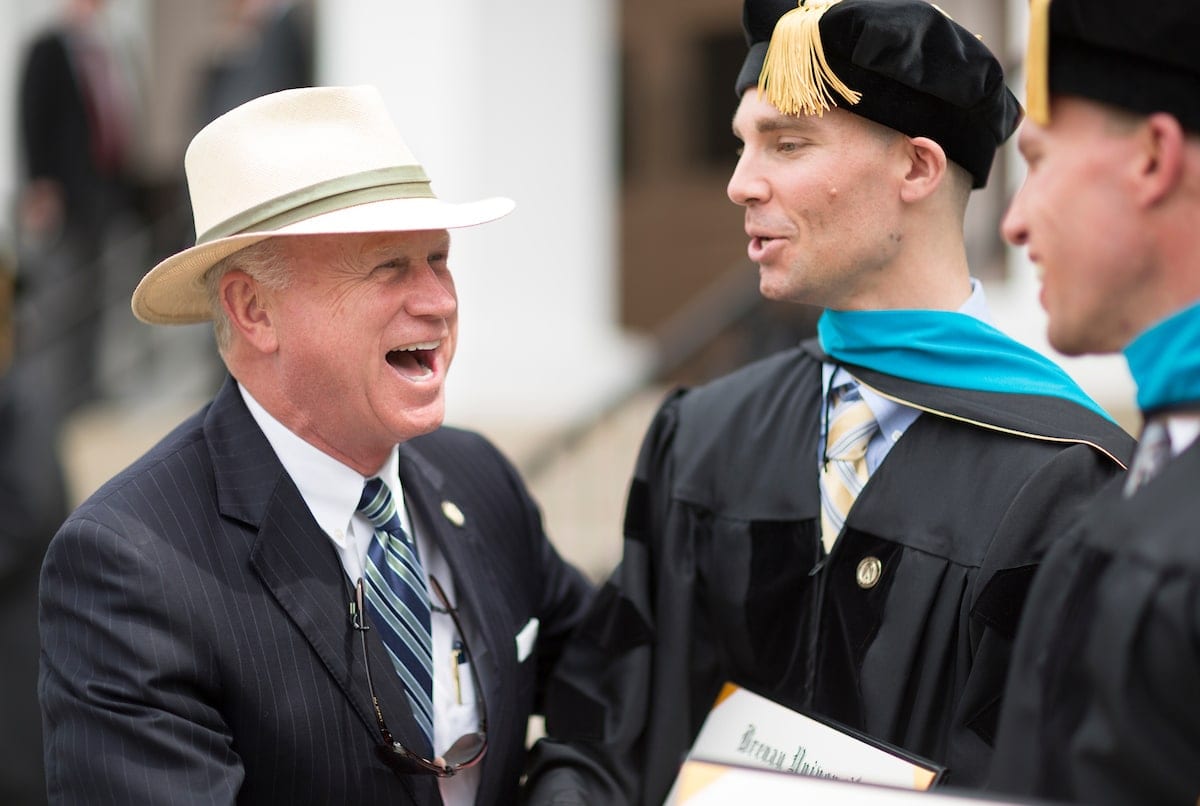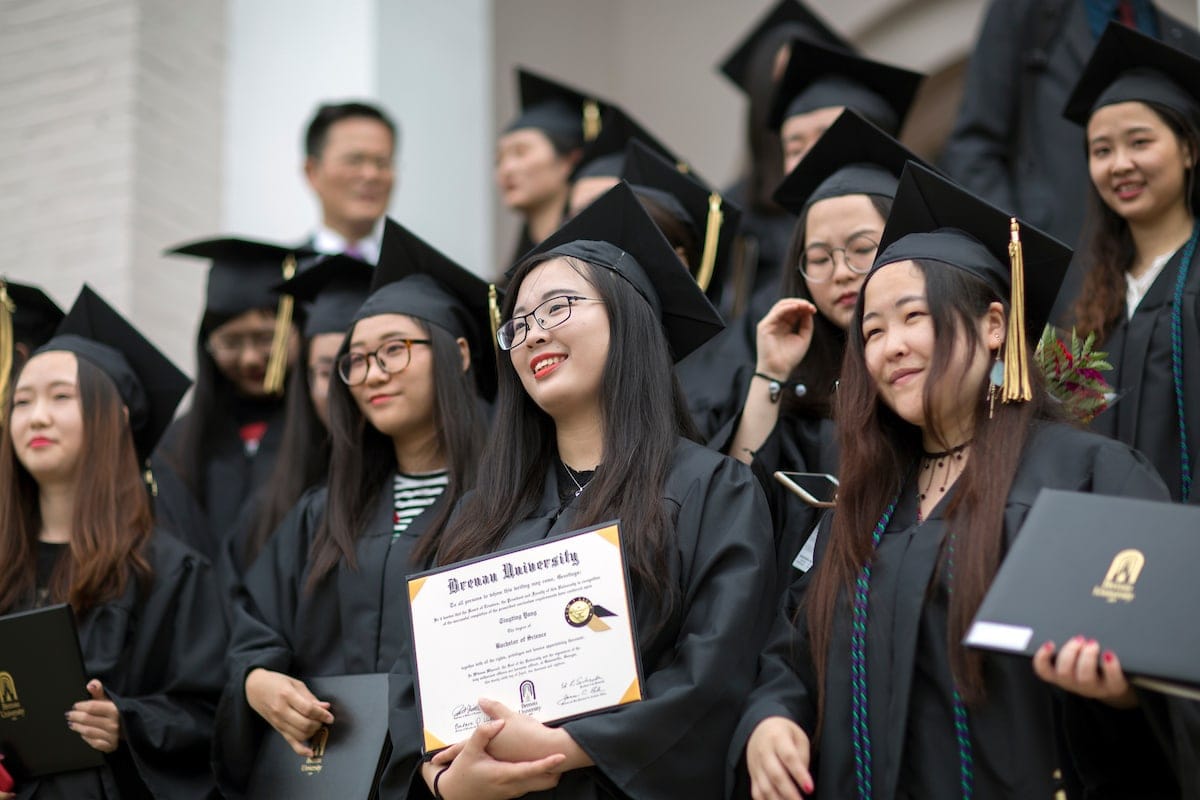
While Brenau University President Ed Schrader distributed diplomas Saturday, May 5, in his institution’s final commencement of the 2017-18 academic year, four officials from the People’s Republic of China monitored the culmination of a U.S.-China deal that is working just fine.
The delegation from Wuhu, about 180 miles west of Shanghai, represented Anhui Normal University, whose 35,000-member student body is larger than the population of Brenau’s North Georgia hometown, Gainesville. For the past two years, 18 ANU students have studied in the United States at Brenau. They graduate this year with dual undergraduate degrees in elementary education from the two institutions.
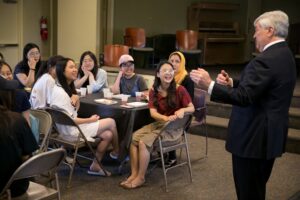
“We want to express our pride in these remarkable young people and in the relationship that we have established with an outstanding university on the other side of the globe,” Schrader said. “And, we can state unequivocally that this is one trade agreement that is a win-win arrangement for both China and the United States.”
Schrader’s remarks were particularly apt as, in Beijing, leaders from China and the United States had just wrapped up two days of talks to halt an escalating trade dispute. According to the Reuters news service, the two parties have “reached a consensus on some aspects of the countries’ trade row, but disagreements over other issues remain ‘relatively big.'”
Although nothing in the ongoing U.S.-China trade dispute has touched on the agreements that Brenau has with ANU, both institutions are watching for any collateral impact, particularly those that could affect the students. The agreements are strategically important to both institutions. When fully implemented, for example, Brenau would annually host about 150 students completing their junior and senior years. They pay a negotiated full tuition rate and room and board.
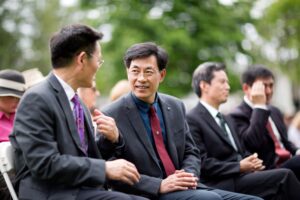
The ANU delegation to Brenau included its highest ranking member, Provost Duanming Zhou; Jinze Zheng, professor of languages and retired dean of the International College; Shengjiong Huang, the current dean of the International College; and Qingsong Sang, dean of the School of Education.
The agreement is known as a 2+2 arrangement between 90-year-old ANU and 140-year-old Brenau. Students, working as a group limited to no more than 30, complete the first two years of their undergraduate studies on their home campus and their last two years at Brenau. A second early childhood education cohort of 24 early childhood majors started as Brenau juniors in August 2017 along with another cohort of 17 ANU students who will major in English. Brenau also has an agreement with ANU for a program in environmental design, which commences in the fall of 2019.
“We understand that the first cohort of graduating students is a landmark,” Zhou said as he addressed the commencement audience through an interpreter, “but this cooperation is just a beginning, and we certainly believe that our partnership will be expanding to all areas [of academics] that we will be able to discuss with your [President Schrader].” Addressing the graduating students in the audience directly, he said, “You are absolutely a great model of the cooperation in higher education between China and the United States.”
Earlier, Zhou, who is an economist, expressed some optimism that the continuing trade talks will be fruitful. Despite some of the rhetoric in public pronouncements by President Donald Trump and other leaders from both countries, the real proof of the negotiations will be in what those who are actually doing the behind-the-scenes work resolve.
“We look forward to improved relations because we (Brenau and ANU) have a good relationship now,” Zhou said. “Without it we will not be here and our students could not come to study here. Perhaps our program will be an example to President Trump.”
Brenau President Schrader call the ANU-Brenau arrangement “the most successful collaboration program with a state-controlled Chinese university and any American undergraduate university.”
The first ANU cohort included 17 women and a single male – Shengzhi Deng, who is known as Harry. During their time at Brenau they posted a combined grade-point average of 3.56 on a 4.0 scale. Ten have been accepted to graduate schools in the United States and China – most with multiple acceptances.
For example, Yi Wang, known as Crystal at Brenau, plans to attend Johns Hopkins University, but she also has been accepted to George Washington University, University of Pittsburgh, University of Florida, Tufts University and University of Georgia. Her classmate “Emily,” Zirui Hong, plans to go to Pennsylvania State University, but she was also accepted to Lehigh and Northeastern.
“Brenau has been a very good experience for me,” said Hong. “All of the teachers have been very patient with us Chinese students, very respectful. I learned a lot.”
Xinyi Wang, known as Lisa, has been accepted to graduate studies at two schools in Hong Kong, but says she probably will pick the University of Science and Technology there. Brenau, she said, “met my expectations” for undergraduate studies – and also offered a chance to share some of her culture with her American classmates. She won third place with a performance at the Brenau’s Got Talent program in January playing the erhu, a traditional Chinese string instrument, then was asked to do an encore performance at the 2018 Women’s Leadership Conference in the spring. As for her overall experience at Brenau and in the United States, she called it simply “unforgettable.”
Xinyan Qiu, known as Daisy, wants to take advantage of provisions of her student visa that enable her to do up to a year-long internship in her field before going to graduate school, but there is a catch: She has offers, like working in the Brenau-City of Gainesville summer camp program for economically disadvantaged children, but the opportunities are in small towns. She doesn’t have a car and needs to work in a city with good public transportation.
Qui, perhaps the most vocal and outgoing of the ANU members of the class of ’18, said she wants to thank everybody who was involved in “giving me the opportunity to study here and live here.”
“Everyone I have met has their own personality and it has been so very exciting to meet different kinds of people and to learn how to communicate with them in a different language,” she said.
On Friday, May 4, the group met together one last time before graduation in the tiny auditorium above the Tea Room on the Gainesville campus for a lunch hosted by the university student services department and featuring the students’ requested menu. No surprises here for the group of young people of about 21 years old on an American college campus: fried chicken fingers.
President Schrader imparted some last-minute instructions about the Saturday ceremony, then stated a near-universal sentiment on the campus.
“It’s going to be great having you as alumni,” said Schrader. “You’ve been great students.”
- May 4, 2018 – Gainesville, Ga: Amanda Lammers, standing, talks with ANU-Brenau University student Jingling “Jocelyn” Heng during a luncheon at Brenau University Friday May 4, 2018 in Gainesville, Ga. (Jason Getz for Brenau University)
- May 4, 2018 – Gainesville, Ga: ANU-Brenau University student Jie “Lily” Li, center, reacts as she shows a photograph on her phone to Brenau University student Razia Hussaini, left, and ANU-Brenau University student Jingling “Jocelyn” Heng (standing) during a luncheon at Brenau University Friday May 4, 2018 in Gainesville, Ga. (Jason Getz for Brenau University)
- Delegates from Anhui Normal University in Wuhu, China, smile during the 2018 Spring Commencement Ceremony on Saturday, May 5, on Brenau University’s historic Gainesville campus. (Nick Bowman for Brenau University)
- The 2018 Spring Commencement Ceremony on Saturday, May 5, on Brenau University’s historic Gainesville campus celebrated the first graduates from the 2+2 partnership between Brenau and Anhui Normal University in Wuhu, China. (Nick Bowman for Brenau University)
- Xin Yan Qiu (center) looks up from her diploma during the 2018 Spring Commencement Ceremony on Saturday, May 5, on Brenau University’s historic Gainesville campus. (Nick Bowman for Brenau University)
- Members of the first cohort of the 2+2 partnership between Anhui Normal University and Brenau University smile and applaud during the 2018 Spring Commencement Ceremony on Saturday, May 5, on Brenau University’s historic Gainesville campus. (Nick Bowman for Brenau University)
- May 5, 2018 – Gainesville, Ga: ANU-Brenau University students cheer during the graduate and undergraduate commencement Saturday May 5, 2018 in Gainesville, Ga. (Jason Getz for Brenau University)
- May 5, 2018 – Gainesville, Ga: ANU-Brenau University student Zirui “Emily” Hong takes a photograph during the graduate and undergraduate commencement Saturday May 5, 2018 in Gainesville, Ga. (Jason Getz for Brenau University)
- Ling “Becky” Xu (left) and Xingyi “Lisa” Wang smile after the 2018 Spring Commencement Ceremony on Saturday, May 5, on Brenau University’s historic Gainesville campus. (Nick Bowman for Brenau University)
- Duanming Zhou, provost of Anhui Normal University in Wuhu, China, laughs during the 2018 Spring Commencement Ceremony on Saturday, May 5, on Brenau University’s historic Gainesville campus. (Nick Bowman for Brenau University)
- Georgia Sen. Butch Miller greets Jinze Zheng, director of the project department for Anhui Normal University, on Saturday, May 5, at the 2018 Spring Commencement Ceremony on Brenau University’s historic Gainesville campus. (Nick Bowman for Brenau University)
- Members of the first cohort of the 2+2 partnership between Anhui Normal University and Brenau University smile with their diplomas following the 2018 Spring Commencement Ceremony on Saturday
- May 5, 2018 – Gainesville, Ga: ANU-Brenau University students pose with ANU and Brenau representatives during the graduate and undergraduate commencement Saturday May 5, 2018 in Gainesville, Ga. (Jason Getz for Brenau University)
- May 5, 2018 – Gainesville, Ga: ANU-Brenau University students pose with Brenau University President Ed Schrader, center, Saturday May 5, 2018 in Gainesville, Ga. (Jason Getz for Brenau University)
- May 5, 2018 – Gainesville, Ga: ANU-Brenau University students throw their mortarboard into the air Saturday May 5, 2018 in Gainesville, Ga. (Jason Getz for Brenau University)
- May 5, 2018 – Gainesville, Ga: ANU-Brenau University students pose with the Brenau University sign Saturday May 5, 2018 in Gainesville, Ga. (Jason Getz for Brenau University)
